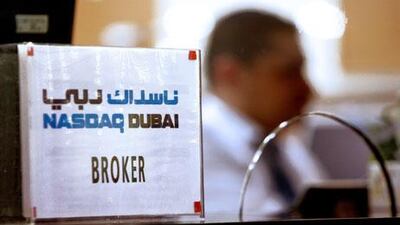Regulated short selling on the UAE's main markets must be introduced to shield investors from volatility and to attract more institutional money, says the chief executive of NASDAQ Dubai.
"The UAE should and can do short selling. It enables you to make money when the market is going down, and it gives all types of investor the ability to buy," said Jeff Singer, the head of Dubai's second bourse.
Short-sellers borrow and sell an asset, hoping to profit by buying it back later for less. NASDAQ Dubai already allows this but the Dubai Financial Market (DFM), which is a much more active index, and the Abu Dhabi Securities Exchange (ADX) do not. The Emirates Securities and Commodities Authority (SCA), the regulator that oversees the DFM and ADX, has prohibited the practice and has spoken out regularly against it because it can drive down the value of equities.
But this year the regulator changed its tune and said the implementation of short selling would help upgrade the UAE markets' status to "emerging".
Morgan Stanley Capital International (MSCI) classifies six of the Gulf's exchanges as "frontier", excluding Saudi Arabia's Tadawul All-Share Index, which is not categorised. Institutional investors often steer clear of frontier markets because they are considered too volatile for a long-term investment to flourish. Industry experts say the acceptance of short selling (shorting) in the market will help reclassify the UAE.
Shorting a stock is also seen as effective when markets are volatile and the opportunities to profit on day-to-day price movements are increased.
"[Shorting] allows for better price discovery and pricing of securities. When volatility is high the premiums are high and it creates a more active options market," said Walid Shihabi, the chief executive of Shuaa Securities. He said a move towards derivatives, or a security that is dependent on the movement of one or more underlying assets, would add depth to the market because it would encourage foreign institutions to participate and use the security as a hedge against a bet. "It has always been a priority from SCA to target those participants," he said. Nick Wright, the head of institutional brokerage at Mubasher, an online trading engine, said derivatives were an important part of having a well-functioning capital market, but the dominance of retail investors who tend to speculate on the movement of a stock had put off the regulator in the past.
"The biggest fear for the regulator is … these markets are dominated by a very large amount of retail speculators. [The regulator] fears it'll give them even more capability to leverage. The regulator hasn't come around to how they're going to protect these investors, I don't think anyone has a master plan for this," Mr Wright said. The UAE has struggled to revive trading volumes after a collapse in property prices in Dubai, the region's financial bellwether.
Volumes and liquidity are down by more than half compared with last year as retail investors flee and less formal derivatives trading, such as over-the-counter (OTC) transactions that allow financial instruments to be traded between two parties, has arisen.
"We should take everything OTC and put it on the exchange," said Mr Singer, who estimated the number of contracts passing between traders on the global OTC market to be in the trillions. Brokers carry out multiple private transactions between each other but this creates a monopoly with the broker rather than the exchange because a broker can demand higher prices.
Moving OTCs to an exchange offers a competitive environment that is well regulated and transparent, Mr Singer said. Sharia-compliant financial instruments could also contribute to growth in the markets.
"If enough need exists there's enough brain power to structure Sharia-compliant derivatives, [but] that will take some time," said Mohammed el Kuwaiz, the chief executive and co-founder of Derayah, an investment firm based in Saudi Arabia.
Under a Sharia-compliant method such as an arbun contract, a purchaser makes a deposit, which forms part of the purchase price, to buy particular assets at a later date. Should the sale not proceed, the seller keeps the deposit. It avoids the speculative nature of standard derivatives.
But the "main barrier" to introducing even Sharia-compliant products is the local regulator, Mr el Kuwaiz said.
"[The SCA is] hesitant to open doors to this as we're retail investors, and putting it in the hands of individuals would make it more volatile. They are more prone to greed and fear," he said.

